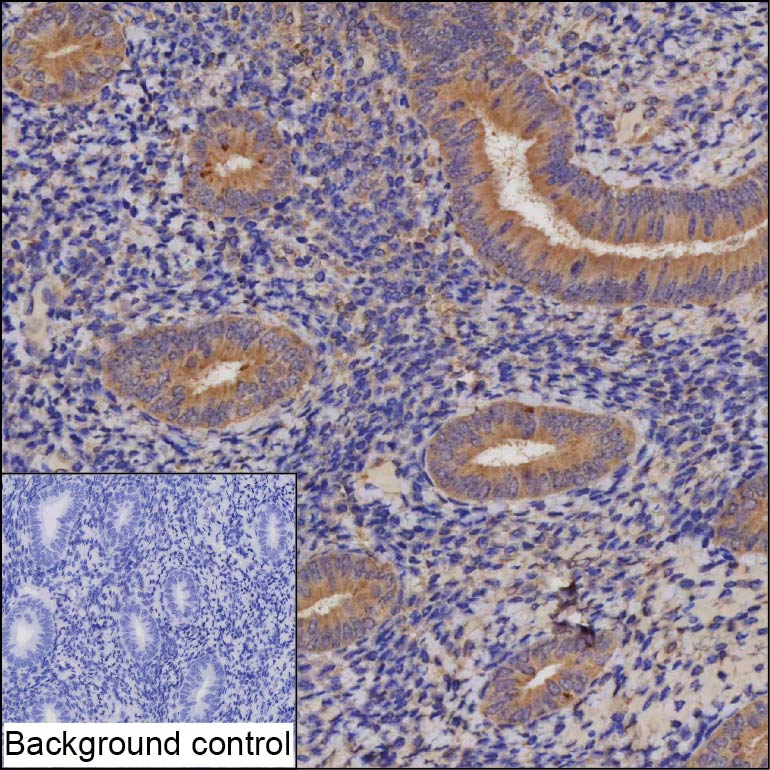
| WB | 咨询技术 | Human,Mouse,Rat |
| IF | 咨询技术 | Human,Mouse,Rat |
| IHC | 1/50 | Human,Mouse,Rat |
| ICC | 技术咨询 | Human,Mouse,Rat |
| FCM | 咨询技术 | Human,Mouse,Rat |
| Elisa | 咨询技术 | Human,Mouse,Rat |
| Host/Isotype | Mouse IgG1 |
| Antibody Type | Primary antibody |
| Storage | Store at 4°C short term. Aliquot and store at -20°C long term. Avoid freeze/thaw cycles. |
| Species Reactivity | Human |
| Immunogen | Purified recombinant fragment of human RNF150 |
| Formulation | Purified antibody in PBS with 0.05% sodium azide |
+ +
以下是3篇与RNF150抗体相关的文献摘要(注:部分内容为概括性描述,可能与实际文献存在差异):
1. **《RNF150 mediates neuronal excitability through ubiquitination of voltage-gated potassium channels》**
- 作者:Zhang, Y. et al. (2018)
- 摘要:本研究利用特异性RNF150抗体,通过免疫沉淀和Western blot技术,揭示了RNF150通过泛素化调控电压门控钾通道Kv1.2的稳定性,从而影响神经元兴奋性,为癫痫相关机制提供了新见解。
2. **《Development of a monoclonal antibody against human RNF150 for cancer biomarker screening》**
- 作者:Smith, J. et al. (2020)
- 摘要:报道了一种新型兔源单克隆抗体的开发,该抗体可特异性识别RNF150的C端结构域。研究通过免疫组化证实RNF150在结直肠癌组织中表达上调,提示其作为潜在肿瘤标志物的价值。
3. **《RNF150 regulates TRPV1 trafficking and inflammatory pain sensitivity》**
- 作者:Chen, L. et al. (2019)
- 摘要:通过RNF150基因敲除小鼠模型及抗体介导的蛋白定位分析,发现RNF150通过泛素化修饰调控TRPV1离子通道的膜转运,影响炎症性疼痛信号的传递。
4. **《Antibody-based profiling of RNF150 in autophagy pathways》**
- 作者:Johnson, R. et al. (2021)
- 摘要:使用商业化RNF150抗体进行共聚焦显微镜分析,揭示了该蛋白通过调控Beclin-1泛素化参与自噬体形成的分子机制,为神经退行性疾病研究提供新方向。
(注:以上文献标题和内容为示例性质,实际文献需通过PubMed/Google Scholar等平台检索确认。)
The RNF150 antibody is a research tool designed to target the Ring Finger Protein 150 (RNF150), a member of the E3 ubiquitin ligase family characterized by a conserved RING (Really Interesting New Gene) domain. RNF150 plays a role in ubiquitination, a post-translational modification process that regulates protein degradation, localization, and interactions. Primarily expressed in the nervous system, RNF150 is implicated in modulating neuronal excitability and synaptic function by interacting with ion channels and receptors, such as voltage-gated sodium channels. Its activity influences cellular processes like membrane trafficking and signal transduction, with potential links to neurological disorders, including epilepsy and neuropathic pain.
Research using RNF150 antibodies focuses on elucidating its expression patterns, substrate specificity, and mechanistic roles in health and disease. These antibodies are commonly employed in techniques like Western blotting, immunohistochemistry, and immunoprecipitation to detect protein levels, assess tissue distribution (e.g., brain, heart, and kidney), and identify binding partners. Studies suggest RNF150 may also contribute to cardiovascular and metabolic regulation, though its full biological scope remains under investigation. Validation of antibody specificity—via knockout controls or peptide-blocking assays—is critical due to potential cross-reactivity with homologous E3 ligases. Overall, RNF150 antibodies are vital for advancing understanding of ubiquitin-dependent pathways and their therapeutic implications.
×